
"Love Is Strange" is a crossover hit by American rhythm and blues duet Mickey & Sylvia, which was released in late November 1956 by the Groove record label.
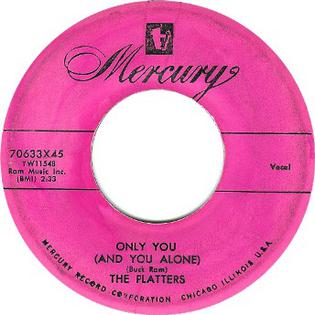
"Only You (And You Alone)" (often shortened to "Only You") is a pop song composed by Buck Ram. It was originally recorded by The Platters with lead vocals by Tony Williams in 1955.

BeBe & CeCe Winans are an American gospel/R&B music brother and sister duo. BeBe and CeCe Winans are the seventh and eighth of the Winans family's ten children, most of whom have had gospel music careers. Together, they have received several awards, including three Grammys.

"Shop Around" is a song originally recorded by the Miracles on Motown Records' Tamla subsidiary label. It was written by Miracles lead singer Smokey Robinson and Motown Records founder Berry Gordy. It became a smash hit in 1960 when originally recorded by the Miracles, reaching number one on the Billboard R&B chart, number one on the Cashbox Top 100 Pop Chart, and number two on the Billboard Hot 100 chart. It was the Miracles' first million-selling hit record, and the first-million-selling hit for the Motown Record Corporation.

Alicia Michelle "Miki" Howard is an American R&B singer who had top 10 hit songs in the mid-1980s and early 1990s, including "Baby, Be Mine" (1987), "Come Share My Love" (1986) and "Love Under New Management" (1990). "Ain't Nobody Like You" (1992) and "Ain't Nuthin' in the World" (1989) both peaked at number one on the U.S. Billboard Top R&B Singles chart.
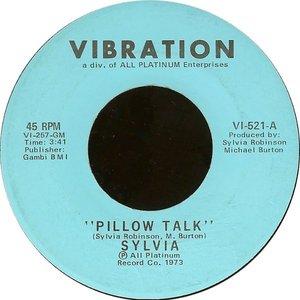
"Pillow Talk" is a 1973 song by American singer and songwriter Sylvia, written by Sylvia along with Michael Burton.
"Wind Beneath My Wings" is a song written in 1982 by Jeff Silbar and Larry Henley.
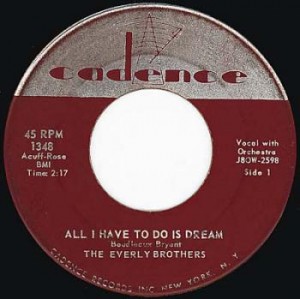
"All I Have to Do Is Dream" is a song made famous by the Everly Brothers, written by Boudleaux Bryant of the husband-and-wife songwriting team Felice and Boudleaux Bryant, and published in 1958. The song is ranked No. 141 on the Rolling Stone magazine's list of The 500 Greatest Songs of All Time. The song is in AABA form.

"When a Man Loves a Woman" is a song written by Calvin Lewis and Andrew Wright and first recorded by Percy Sledge in 1966 at Norala Sound Studio in Sheffield, Alabama. It made number one on both the Billboard Hot 100 and R&B singles charts. Country singer John Wesley Ryles had a minor hit with his version of the song in 1976. Singer and actress Bette Midler recorded the song and had a Top 40 hit with her version in 1980. In 1991, Michael Bolton recorded the song and his version peaked at number one on both the Billboard Hot 100 chart and the Billboard Adult Contemporary Singles chart.

"Piece of My Heart" is a romantic soul song written by Jerry Ragovoy and Bert Berns, originally recorded by Erma Franklin in 1967. Franklin's single peaked in December 1967 at number 10 on the Billboard Hot Rhythm & Blues Singles chart in the United States.
"I Believe in You and Me" is a song written by Sandy Linzer and David Wolfert in 1982. The song was first recorded and released by the R&B group The Four Tops, who released it as a single from their album One More Mountain (1982). While it failed to reach the US Top 40, it became a moderate hit for the group on the US Billboard R&B chart, peaking at number 40 in early 1983.

"For the Love of Money" is a soul, funk song that was written and composed by Kenneth Gamble, Leon Huff, and Anthony Jackson; it was recorded by Philadelphia soul group The O'Jays for the album Ship Ahoy. Produced by Gamble and Huff for Philadelphia International Records, "For the Love of Money" was issued as a single in late 1973, with "People Keep Tellin' Me" as its B-side. The single peaked at number three on the U.S. Billboard R&B chart, and at No. 9 on Billboard's Pop Singles chart in spring 1974. Though the album version of the song was over seven minutes long, it received substantial radio airplay. The song's title comes from a well-known Bible verse, 1 Timothy 6:10: "For the love of money is the root of all evil: which while some coveted after, they have erred from the faith, and pierced themselves through with many sorrows." The song was also used as the opening theme song for NBC’s The Apprentice.

"Sweet Love" is a song by American R&B singer and songwriter Anita Baker from her second studio album, Rapture (1986). It was written by Anita Baker, Louis A. Johnson, and Gary Bias, and produced by Michael J. Powell. It was released in May 1986 as the album's first single.
"Dance with My Father" is a song by Luther Vandross and the title track to his thirteenth studio album. It was released in May 2003 as the album's lead single. With Richard Marx, Vandross wrote the song based on his personal experience. The lyrics recall childhood memories with Vandross's father, who used to dance with him and his mother.

"Love Is" is the title of a 1993 duet written by Tonio K, Michael Caruso and John Keller, and originally recorded and released by American singer and actress Vanessa Williams and American R&B recording artist Brian McKnight. The single originally appeared on the soundtrack to the television drama series Beverly Hills, 90210; and was also used in the spin-off series Melrose Place. After this exposure, the song peaked at number three on the US Billboard Hot 100, becoming McKnight's breakthrough hit and another hit for Williams. The song peaked at number one on the Billboard Adult Contemporary chart, where it spent three weeks at the summit.

"Where Is the Love" is a popular song written by Ralph MacDonald and William Salter, and recorded by Roberta Flack and Donny Hathaway. Released in 1972 from their album, Roberta Flack & Donny Hathaway. It peaked at number five on the Billboard Hot 100 singles chart and spent a week each at number one on the Billboard Easy Listening chart and R&B chart. Billboard ranked it as the No. 58 song for 1972. The song won a Grammy Award for Best Pop Performance by a Duo or Group with Vocals.
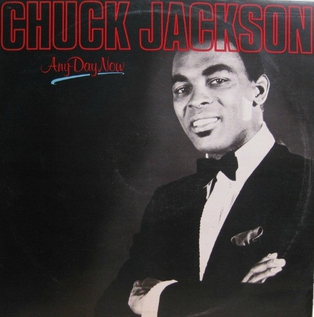
"Any Day Now" is a popular song written by Burt Bacharach and Bob Hilliard in 1962. It has been recorded by numerous artists over the years, including notable versions by Chuck Jackson in 1962, Alan Price in 1965, Elvis Presley in 1969, Scott Walker in 1973 and Ronnie Milsap in 1982. In the lyrics, the singer predicts the imminent demise of a romantic relationship and describes the sadness this will leave.
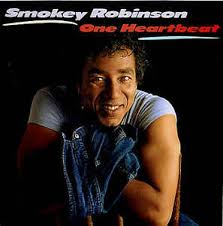
One Heartbeat is an album by American R&B singer/songwriter Smokey Robinson, released in 1987. It hit number 26 on the US Billboard Album Chart and number 1 on the US Billboard R&B album chart. The album contains Robinson's last two US Billboard top 10 singles: "Just to See Her" and "One Heartbeat". "What's Too Much" was released as the album's third and final single. The album was certified Gold by the RIAA.
"Share Your Love with Me" is a song written by Alfred Braggs and Deadric Malone. It was originally recorded by blues singer Bobby "Blue" Bland. Over the years, the song has been covered by various artists, most notably Aretha Franklin who won a Grammy Award for her 1969 rendition. Other artists who covered the song include The Band in 1973, Kenny Rogers in 1981, and most recently, Van Morrison in 2016.
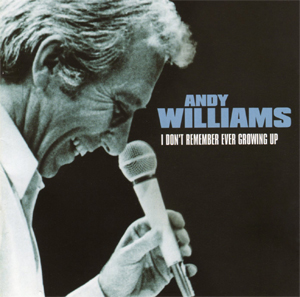
I Don't Remember Ever Growing Up is the forty-third and final studio album by American pop singer Andy Williams, released in the UK by the Demon Music Group in 2007. In the liner notes of the album Williams writes, "Over the past few years I have come across songs that I really wanted to record. I picked 13 of my favorites and set out to make a new record." While the title track is the only new song, the other 12 selections were chart hits for other artists or, as is the case with "Desperado" by the Eagles, received critical acclaim without having been released as a single.















